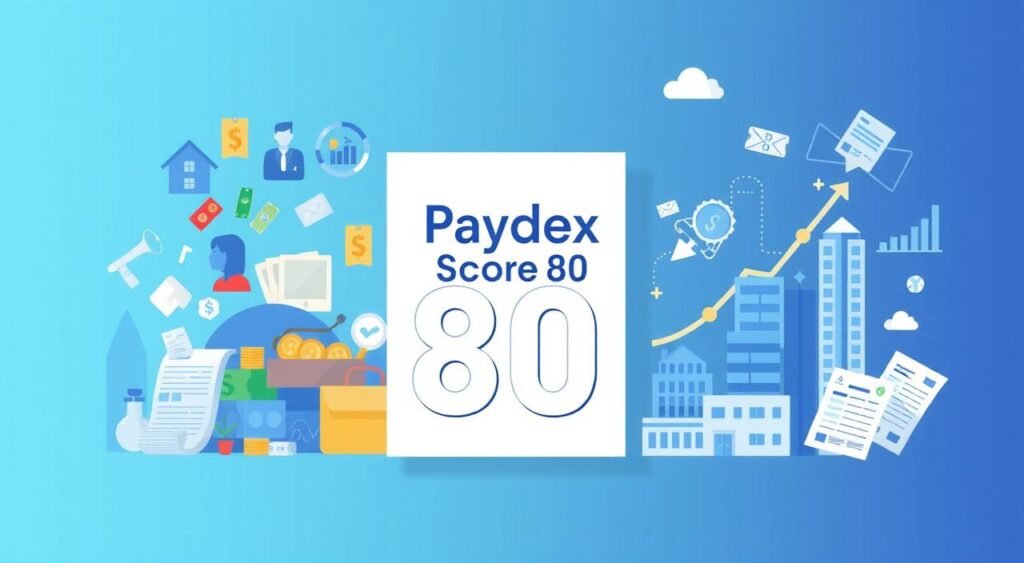Did you know a Paydex score of 80 or higher can boost your business’s financing chances and credit terms1? This guide will help you reach that 80+ score. It’s a key step to get the capital and credit your business needs to grow.
Key Takeaways
- Paydex scores range from 0 to 100, with higher scores showing better creditworthiness1.
- A score of 80-100 is seen as low risk, 50-79 as medium, and 0-49 as high risk1.
- Important factors in a Paydex score include payment history, trade experiences, credit use, supplier trust, and credit length1.
- Lenders, vendors, and suppliers quickly judge a company’s Paydex score1.
- Keeping a high Paydex score can open doors to financing and better credit terms. But a low score can raise red flags1.
What is a Paydex Score?
The Paydex Score is a business credit score from Dun & Bradstreet (D&B) that goes from 0 to 1002. It shows how well a business pays its debts on time. A higher score means better payment history2.
Lenders and vendors look at this score to decide if they should lend money. They also use it to set interest rates and repayment terms2.
A Paydex score above 80 means a business is low risk for creditors2. Dun & Bradstreet suggests having at least three trade references from two different suppliers for an accurate score2. The score is based on the dollar value of payments, so bigger payments count more2.
The Paydex score falls into different ranges2:
- 80 to 100: Low risk, payments usually within 30 days before due date2.
- 50 to 79: Medium risk, payments 2 to 30 days after due date2.
- 0 to 49: High risk, payments 31 to 120 days after due date2.
Unlike personal credit scores, the Paydex score is for businesses only. It ranges from 0 to 1002. Keeping a Paydex score of at least 75 shows a business is likely to pay on time3.
Importance of Having a Good Paydex Score
A strong business credit score is key for any business’s success. The Paydex score from Dun & Bradstreet (D&B) shows how creditworthy a company is. It ranges from 0 to 100, with higher scores meaning better payment history4.
Lenders and suppliers look at the Paydex score to see if a business will pay on time. A good score can lead to better loans and higher credit limits5. But, a low score can make it hard to get loans or good payment terms5.
Keeping a Paydex score above 80 shows a business is financially responsible4. This can lead to more business opportunities. Many companies want to work with those who pay on time5.
In today’s business world, a high Paydex score can make a big difference. It can help you get better contracts. By focusing on a good Paydex score, business owners can improve their credit and get better loans and terms45.
Identify Creditors That Report to Dun & Bradstreet
To boost your business credit score, start by finding out which creditors report to Dun & Bradstreet (D&B)6. Unlike personal credit bureaus, business credit bureaus like D&B don’t share data6. This means only accounts reported to D&B will affect your Paydex score. New businesses should focus on vendor tradelines, as they’re the only accounts that count in the Paydex score6.
Companies like Ramp, Capital One, and Bank of America report to D&B6. It’s key to remember not all business credit cards report to D&B or other business credit agencies6. Always check with the issuer to be sure.
| Vendor | Credit Reporting | Minimum Order/Purchase | Credit Terms |
|---|---|---|---|
| Uline | Experian Commercial, Dun & Bradstreet | – | Net 30 |
| Quill | Experian Commercial, Dun & Bradstreet | – | Net 30 (approval within 24 hours) |
| Grainger | – | – | Net 30 (application process) |
| Summa Office Supplies | Equifax Business, Experian Business | $75 | Net 30 |
| Ohana Office Products | Equifax Business, Experian Business | – | Net 30 |
| Business T-Shirt Club | – | 12 pieces | Net 30 (50% upfront deposit) |
| Home Depot Commercial Credit Cards | Dun & Bradstreet | – | – |
By focusing on vendor tradelines that report to D&B, you can start building your business credit profile67. This will help improve your Paydex score over time67.
Open New Tradelines or Credit Accounts
Building your business credit is key to a good Paydex score. Open new tradelines or credit accounts with vendors and suppliers that report to Dun & Bradstreet (D&B)89. This boosts your Paydex score, which goes from 0 to 1009.
Apply for vendor credit accounts with suppliers or service providers. These are great for building your credit, needing less strict requirements than business credit cards10. But, don’t take on too much debt. Paying on time is crucial for a better Paydex score8.
Also, think about getting business credit cards or other tradelines that report to D&B. They might need a solid credit history, but can help your Paydex score if you manage them well10.

The goal is to have different credit sources and show you can manage credit well. By opening new tradelines and paying on time, you build a strong credit profile. This can lead to better financing and vendor relationships as your business grows10.
| PAYDEX Score | Payment Performance |
|---|---|
| 100 | Payments made 30 days early |
| 80 | Payments made on the due date |
| 70 | Payments made 15 days late |
| 50 | Payments made 30 days late |
| 30 | Payments made 90 days late |
| 1-19 | Payments made more than 120 days late |
“An 80 PAYDEX score means a business pays debts on time or early, on average.”8
By using these strategies and managing your credit well, you can improve your Paydex score. This will help you get the most out of a strong business credit profile910.
Make On-Time or Early Payments
Your payment history is key in the Paydex scoring model11. Dun and Bradstreet looks at when you pay your bills. They give more weight to bigger payments11. To get an 80 Paydex Score, you must pay on time11.
If you’re late, making early payments can help you catch up quickly12. Paying bills early shows you’re financially responsible. This is something lenders and vendors value a lot12.
- Paydex Scores range from 1 to 100 and reflect a business’s payment performance, with higher scores indicating on-time or early payments11.
- Businesses with Paydex Scores between 80 to 100 are considered low risk, indicating early payments12.
- A minimum of three reported trade experiences from at least two trade references is required to start calculating a Paydex score12.
By paying on time or early, you show you’re financially responsible. This can improve your Paydex Score. It can also lead to more credit opportunities and better terms with vendors and suppliers.
“Maintaining a high Paydex Score is crucial for businesses seeking to build strong business credit and access favorable financing options.”
| Paydex Score Range | Risk Level | Payment History |
|---|---|---|
| 80 – 100 | Low Risk | 0-30 days before the due date |
| 50 – 79 | Medium Risk | 2-30 days late |
| 0 – 49 | High Risk | 31-120 days late |
By paying on time or early, you can boost your payment history. This is the most important part of Paydex score calculation1112. It can help you get a dollar-weighted average Paydex Score of 80 or higher. This shows you’re a low-risk business and can get better credit and vendor terms1112.
Paydex Score Improvement Plan
Creating a solid Paydex score improvement strategies is key for businesses wanting to manage their business credit well. This plan should include important steps like finding Dun & Bradstreet (D&B) creditors, opening new tradelines, and making payments on time. It’s also important to keep credit use low, separate personal and business credit, and fix any wrong info in your D&B report13.
A good D&B PAYDEX score is 80 or above, showing a business pays debts on time13. Scores over 80 mean you pay early, with the best score being 100 for always paying 30 days early13. By sticking to these strategies, businesses can boost their Paydex score and gain trust from lenders and vendors13.
To get a PAYDEX score, a business needs a D-U-N-S number and must have paid at least four vendors14. Fixing a low PAYDEX score is tough, as not all suppliers report payments to Dun & Bradstreet13. Getting help from credit repair experts, like those at North Shore Advisory, is a smart move to tackle credit issues13.

The Paydex Score from Dun & Bradstreet goes from 0 to 100, showing risk levels based on payment history15. D&B Business Credit Scores are from 1 to 5, comparing payment histories. The Financial Stress Score also ranges from 1 to 5, showing a company’s financial health15. Knowing these scores helps businesses create a detailed plan to boost their Paydex score and improve their business credit management.
Keep Credit Utilization Low
Your Paydex score doesn’t directly count credit utilization, but it’s still key for showing you’re financially disciplined16. Experts say to keep your debt-to-credit ratio under 30% for the best scores16. This helps your Paydex score and other credit scores, like Dun & Bradstreet’s PAYDEX, which look more at payment history16.
Managing your credit well shows lenders you’re a reliable borrower17. It’s important to keep working on this to keep your business credit scores up17. Focus on budgeting, paying bills on time, and managing credit risks to boost your scores17.
Business credit cards might not directly affect your Paydex score, but they still matter for your creditworthiness16. They usually don’t report credit utilization to major bureaus, so they don’t hurt your personal scores16. But, if you miss payments, it can hurt your personal credit16.
Keeping your credit utilization low shows you’re financially responsible181716. This can help your business credit and make it easier to get financing181716.
“Good credit management is essential for the success of any business, as it can open up opportunities for growth and access to capital.”
Separate Personal and Business Credit
Keeping your personal and business credit separate is key for your business’s financial health19. A Paydex score ranges from 0 to 100, with 80 or higher being good and 90 or higher excellent19. To get a Paydex score, your business needs 3-5 credit accounts with Dun & Bradstreet19.
Mixing personal and business credit can cause problems. These include messy financial records, personal liability for business debts, and risks to your personal credit scores.
To avoid these issues, apply for vendor and financial tradelines in your company’s name, not yours20. Business lenders might check your personal credit when you apply for financing. Personal credit should not show up on business reports but can still affect financing20. Try to avoid personal guarantees to keep your credit separate20.
Getting an Employer Identification Number (EIN) from the IRS is key for a business credit profile separate from personal credit.20 This makes your business a distinct entity with its own credit history20. By separating your personal and business credit, you can manage your company’s finances well and protect your personal credit.

Remember, keeping your personal and business credit separate is vital for a strong Paydex score and your business’s success1920. By following these tips, you can protect your financial future and help your business grow1920.
Dispute Inaccurate Information
Keeping your business credit report accurate is key to a good Paydex score. Errors in your business credit report can hurt your Dun & Bradstreet (D&B) reporting and lower your Paydex score21. Even a small mistake in payment dates can affect your score a lot21.
To fix errors in your D&B credit report, use the D&B DUNS Manager portal. Here, you can verify your identity and business details. Then, you can ask for updates and dispute any wrong “payment experiences.”21 While D&B might not always agree with your credit report disputes, it’s important to regularly check and fix your report. This helps keep your Paydex score strong21.
Disputing Credit Report Errors
The credit bureaus, like D&B, must look into credit report disputes within 30 days21. But, it’s a good idea to follow up on your disputes to get things fixed fast21. By fixing any mistakes in your business credit report, you can improve your credit scores and get better loan offers21.
“Disputing credit report errors can lead to improved credit scores and loan approvals.”
By being proactive in checking and disputing any business credit report errors, you can protect your Paydex score. This ensures your company’s financial health is shown correctly21. Staying alert to Dun & Bradstreet reporting and fixing any business credit report errors is vital for improving your Paydex score21.
Tips for New Businesses
Building a strong business credit profile is key for new businesses. Start by getting a DUNS number from Dun & Bradstreet22 and an Employer Identification Number (EIN) from the IRS. These numbers show your business is its own entity, helping you build credit separate from your personal one23.
New businesses should also work on opening vendor tradelines. These are easier to get and help your Paydex score22. The Paydex score, from 1 to 100, shows how well you pay debts on time. A higher score means you’re good at making payments22.
To get a Paydex score, you need to have records with at least four vendors22. By starting with these steps, new businesses can build a solid credit foundation. This sets them up for future growth and success.
| Key Steps for New Businesses | Benefits |
|---|---|
| Obtain a DUNS number | Establishes your business as a separate entity |
| Obtain an EIN | Helps build business credit independently from personal credit |
| Open vendor tradelines | Contributes to a higher Paydex score |
By following these steps, new business owners can actively build their credit. This prepares their company for long-term success23.
“Establishing a strong business credit profile is essential for the long-term growth and success of any new business.”
Conclusion
Keeping a high Paydex score is key for businesses. It helps get better financing, build trust with vendors, and shows they are creditworthy24. A score from 0 to 100, with 100 being the best, shows a business can handle its money well and pay on time2425.
To boost your Paydex score, follow some simple steps. Start by finding out who reports to D&B, open new credit lines, and pay bills on time2526. Also, keep your business and personal credit separate and fix any mistakes in your report2526. This way, you can improve your score and show you’re financially sound2526.
A good Paydex score shows a business is financially healthy and reliable. It helps get loans, build strong supplier relationships, and reach financial goals242526. By focusing on your Paydex score, you can increase your financial trustworthiness and succeed more in the market.
FAQ
What is the Paydex Score?
Why is having a good Paydex Score important?
How can I identify the creditors that report to Dun & Bradstreet?
What should I do to open new tradelines or credit accounts?
How can I make on-time or early payments to improve my Paydex Score?
What should I include in my Paydex Score improvement plan?
How does credit utilization affect my Paydex Score?
Why is it important to separate my personal and business credit?
How can I dispute inaccurate information in my Dun & Bradstreet credit report?
What are the key steps for new businesses to establish business credit?
Source Links
- What Is A Paydex Score & Why Does It Matter? – https://thecreditreview.com/business-banking/what-is-a-paydex-score
- What Is A Paydex Score? | Bankrate – https://www.bankrate.com/credit-cards/business/what-is-paydex-score/
- PAYDEX Score: The Dun & Bradstreet Business Credit Rating – https://www.nav.com/business-credit-scores/dun-bradstreet-paydex/
- PAYDEX Score: The Only Ultimate Guide You Need To Read – https://www.forbes.com/advisor/credit-score/paydex-score/
- The Top Benefits of Having a Good Business Credit Score – https://www.forafinancial.com/blog/small-business/benefits-good-business-credit-score/
- Best Business Credit Cards That Report to D&B in 2024 – https://ramp.com/blog/business-credit-cards-that-report-to-dun-and-bradstreet
- 7 Best Vendors To Help Build Business Credit in 2024 – https://tipalti.com/financial-operations-hub/vendors-that-report-business-credit/
- How to Get an 80 PAYDEX Score | eCredable – https://business.ecredable.com/resources/blog/how-to-get-80-paydex-score
- How to Get a PAYDEX Score of 80: The Essential Guide – https://www.unitedcapitalsource.com/blog/paydex-score-80/
- Business Tradelines and How they Affect Your Credit Score | Nav – https://www.nav.com/resource/business-tradelines/
- Paydex Score: Everything You Need to Know – https://paymentcloudinc.com/blog/paydex-score/
- Understanding the Paydex Score – https://www.businessinsider.com/personal-finance/credit-score/what-is-paydex-score
- D&B PAYDEX Score FAQ – Business Credit Score Guide – https://northshoreadvisory.com/business-credit/business-credit-scores/dnb-paydex-score-faqs/
- PAYDEX Business Credit Score: See What Yours Means – https://www.creditsuite.com/blog/decoding-the-paydex-business-credit-score/?srsltid=AfmBOooGwId_H7ZghBzfs63nOgDcSb9XfLxm8Quht90dHYGrRM1V6Qny
- Free Credit Score for Business: Get PAYDEX Score Free – https://www.creditsuite.com/blog/free-credit-score-for-business/?srsltid=AfmBOopI5kWf3zRYcqfrdOjMqZ_KIkioK8QTxEK1by5c0O3OqoZzcTwK
- How Maxing Out Business Credit Cards Impacts Credit Scores | Nav – https://www.nav.com/business-credit-card/maxed-out-credit-cards-heres-how-maxing-out-your-business-credit-card-affects-your-credit-scores/
- How to maintain and build your business credit score – https://newitymarket.com/business-loans/how-to-maintain-and-build-your-business-credit-score/
- Credit score basics for Small Businesses – https://business.bankofamerica.com/resources/credit-score-basics-for-small-businesses.html
- Building Your Business Credit When Your Self Employed – https://njlenders.com/blog/building-business-credit-when-self-employed-mortgage
- How to Build Business Credit with Bad Personal Credit – Credit Strong – https://www.creditstrong.com/how-to-build-business-credit-with-bad-personal-credit/
- How To Dispute Any Errors Or Inaccuracies On Your Business Credit Reports And Get Them Corrected – FasterCapital – https://fastercapital.com/topics/how-to-dispute-any-errors-or-inaccuracies-on-your-business-credit-reports-and-get-them-corrected.html/3
- PAYDEX Business Credit Score: See What Yours Means – https://www.creditsuite.com/blog/decoding-the-paydex-business-credit-score/?srsltid=AfmBOoqc0tLj-JkifYZO_64L0CjOUOEPMvXgajs8Pud-P7ZTJb30MCLa
- 5 Tips for Increasing Your Business Credit Score – https://www.novo.co/resources/5-tips-for-increasing-your-business-credit-score
- Paydex Scores: Your Key to Small Business Financial Success. – https://www.paycron.com/blog/unlocking-financial-success-a-comprehensive-guide-to-paydex-scores-for-small-businesses
- PAYDEX Score: The Dun & Bradstreet Business Credit Rating – https://ramp.com/blog/what-is-a-paydex-score
- Understanding the PAYDEX Score: Your Business’s Credit Score 📊🏢 – https://www.linkedin.com/pulse/understanding-paydex-score-your-businesss-credit-paul-a-damiano-l3t4e

